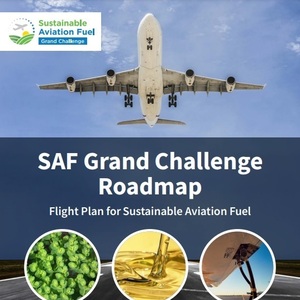DOE releases roadmap to achieve carbon neutral aviation emissions

September 23, 2022
BY U.S. Department of Energy
U.S. Secretary of Energy Jennifer M. Granholm today announced the release of the Sustainable Aviation Fuel Grand Challenge Roadmap, a comprehensive plan that outlines a government-wide strategy for scaling up new technologies to produce sustainable aviation fuels (SAFs) across the U.S. airline industry. A collaboration between the U.S. Departments of Energy, Agriculture, Transportation, the Environmental Protection Agency, and Federal Aviation Administration, the roadmap will spur technological innovation to produce SAF, position the country as a global leader in the emerging SAF market, and enable America to meet President Biden’s clean energy goal of a net-zero carbon economy by 2050.
“From field to flight, this data-driven technology strategy will help guide America’s scientists and industry to chart our course to clean skies,” Granholm said. “Not only is Sustainable Aviation Fuel critical to decarbonizing the airline industry and reaching our climate goals, but this plan will help American companies corner the market on a valuable emerging industry.”
U.S. commercial aviation currently consumes approximately 10 percent of all transportation energy and contributes 2percent of the nation’s C02 emissions. SAF has the potential to deliver the performance of petroleum-based jet fuel but with a fraction of its carbon footprint—emerging SAF pathways even have a net-negative GHG footprint. SAF can be made from renewable biomass and other resources, including corn grain, algae, agricultural and forestry residues, and municipal solid waste streams, and enough biomass can be collected sustainably each year in the United States to produce 50-60 billion gallons of low-carbon fuels. Growing, sourcing, and producing SAF from renewable and waste resources can also create new economic opportunities in agricultural and rural communities, improve the environment, and even boost aircraft performance.
“Today’s announcement charts out actions to ensure crops used for fuel—that are grown here at home by hard-working Americans—can create opportunities for American farmers, business owners and rural communities,” said Agriculture Secretary Tom Vilsack.
Advertisement
Advertisement
“SAF development will be essential for airlines to further reduce their emissions, and A4A applauds today’s launch of the Biden Administration’s SAF Roadmap to support our shared goal of reaching net-zero emissions by 2050. U.S. airlines have pledged to work with government and other stakeholders to make 3 billion gallons of cost-competitive SAF available to aircraft operators by 2030, and this roadmap outlines a variety of initiatives to help make that goal a reality,” said Nicholas Calio, President and CEO of Airlines for America.
“SAF production is an investment in America that not only reduces environmental impacts, but supports energy independence while creating U.S. jobs,” said Ed Bastian, Delta Air Lines CEO. “Our ambitious path forward includes a near-term goal of replacing 10 percent of our jet fuel with SAF by the end of 2030, which will require continued work alongside our suppliers and policymakers so that SAF can become as economical and widely available as traditional jet fuel, and we welcome the finalization of the SAF Grand Challenge Roadmap.”
“SAF is critical to decarbonizing the aviation sector, and we’re incredibly thankful that the Administration recognizes the need to jumpstart the usage of SAF in the United States,” said Bob Jordan, Southwest Airlines CEO. “The SAF Grand Challenge Roadmap is important to enabling our goal to replace 10 percent of our total jet fuel consumption with SAF by 2030 and supports our efforts to partner with organizations and government entities to help our industry reach carbon neutrality by 2050.”
The SAF Grand Challenge Roadmap ensures alignment of government and industry actions and coordinates national policies to achieve the goals of the SAF Grand Challenge, which was signed in 2021 by the partnering agencies and consists of two major goals:
•Achieve a minimum of a 50 percent reduction in life GHG emissions compared to conventional fuel; and
Advertisement
Advertisement
•Supply sufficient SAF to meet 100 percent of aviation fuel demand by 2050.
The SAF Grand Challenge objectives include expanding SAF supply and end use, reducing its cost, and enhancing its sustainability. The roadmap also helps position the United States as an exporter of SAF technology and fuels to support other countries in their efforts to decarbonize aviation. The full Roadmap report and more information about the SAF Grand Challenge can be found on the Department of Energy website.
Related Stories
Bangkok Airways Public Company Limited has officially announced the adoption of sustainable aviation fuel (SAF) on its commercial flights, reinforcing Thailand’s green aviation industry. The initiative took effect starting July 1, 2025.
Avalon Energy Group LLC and Sulzer Chemtech have signed a strategic alliance and partnership agreement to scale up the production of SAF. Under the agreement, Avalon has selected BioFlux technology for its portfolio of SAF projects.
The USDA has announced it will delay opening the first quarterly grant application window for FY 2026 REAP funding. The agency cited both an application backlog and the need to disincentivize solar projects as reasons for the delay.
Neste and DHL Express have strengthened their collaboration with the supply of 7,400 tons (9.5 million liters) of neat, i.e. unblended, Neste MY Sustainable Aviation Fuel to DHL Express at Singapore Changi Airport starting July 2025.
CoBank’s latest quarterly research report, released July 10, highlights current uncertainty around the implementation of three biofuel policies, RFS RVOs, small refinery exemptions (SREs) and the 45Z clean fuels production tax credit.
Upcoming Events










